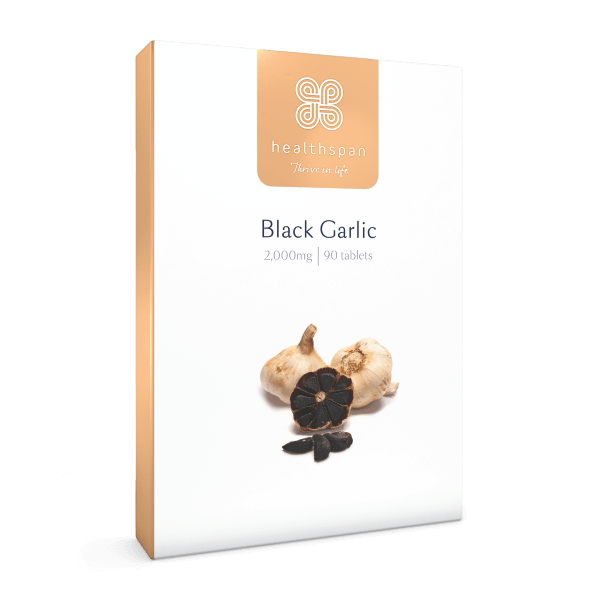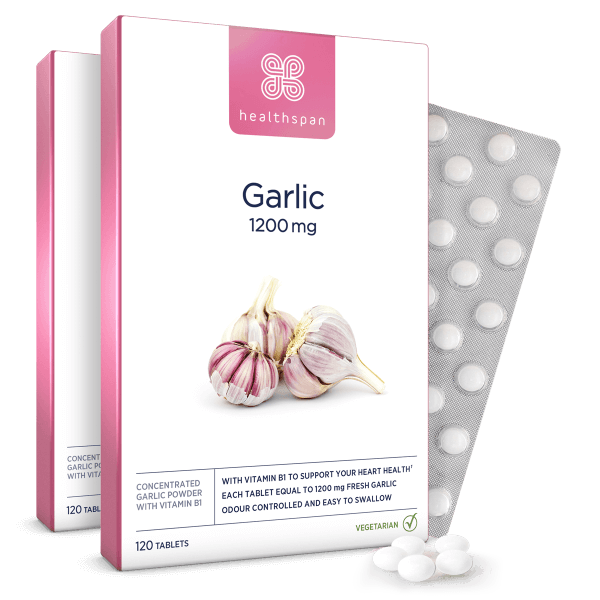Garlic has been used for thousands of years for its medicinal and therapeutic properties. Traditionally we have used the fresh raw white kind, but black garlic is becoming increasingly popular. Find out which is better for your health.
🕒 4 min read
What is black garlic?
Quite simply, black garlic is garlic that has been fermented or aged. Once it has been fermented and turns black, it takes on an entirely different flavour and texture – variously described as having a mild sweetness, a nuttiness or tasting like molasses.
Think of it as a caramelised form of garlic, in the same way that caramelising onions gives them a sweetness.
The fermentation process involved in developing black garlic means it contains around two to three times the antioxidants (substances which protect your cells from oxidative damage, which is implicated in a whole range of diseases and conditions) of raw unfermented garlic.
The health benefits of black garlic
May help to reduce the risk of heart disease
One study of rats on a high-fat diet showed that black garlic helped reduce total fats in the blood, total cholesterol, and triglycerides – a type of fat or lipid, high levels of which can contribute to hardening of the arteries or thickening of the artery walls.
Elevated levels of these are usually markers of an increased risk of heart disease. A 2018 study on 60 people with coronary heart disease, who were given 20 grams of black garlic extract daily for six months, showed them to have increased antioxidant levels and some improvements in heart health compared with those given a placebo.
Could help protect cognitive health
Researchers and scientists have suggested for some time that the accumulation of a protein known as beta amyloid causes inflammation in the brain linked to an increased risk of Alzheimer's.
A study on rats has shown that black garlic could reduce the inflammation caused by beta amyloid and possibly also improve short-term memory. No comparative study has yet to be carried out on humans.
Could help protect your liver
One rat study has shown that black garlic improved liver health and function in those with alcohol-induced liver damage, thought to be the effect of its antioxidant properties.
Another has shown that it appears to offer protective effects if the liver becomes damaged, helping to prevent any further damage, and scientists suggest it could be used in conjunction with other medical treatments.

Black Garlic
Black garlic extract and vitamin B1 to support your heart
- Prepared using an advanced fermentation process
- Higher active ingredient levels than standard garlic
- Added vitamin B1 to support a healthy heart
The health benefits of white garlic
White garlic has been used for centuries, both topically and ingested, for therapeutic purposes, and scientists now know that most of its beneficial properties stem from the sulphur compounds formed when garlic is crushed, cut up, chopped or chewed (the most researched of these is allicin).
A nutrient-dense food, white garlic is low in calories but high in vitamins C and B6, and minerals selenium and manganese. Research has shown it could help:
Reduce the incidence and duration of the common cold
A 12-week study showed that taking a daily garlic supplement reduced the number of colds in a sample group by a hefty 63 per cent (and those who took it also recovered faster) compared with those taking a placebo.
Another study showed a high dose of aged garlic extract supplementation (just over 2.5 grams a day) reduced the number of sick days taken off with cold or flu by 61 per cent.
Reduce blood pressure
Studies have found garlic supplements to have a very significant effect in reducing blood pressure in those diagnosed with hypertension.
One study, for example, showed giving people between 600-1,500mg of garlic extract a day was just as effective as the drug Atenolol at reducing blood pressure over 24 weeks. To achieve a similar effect, it is suggested you would have to eat at least four cloves of garlic daily.
It could improve bone health
A number of studies on rats have shown that taking garlic appears to minimise bone loss and the likelihood of osteoporosis in female rats by increasing oestrogen levels.
A study on menopausal women found that taking two supplements of garlic extract daily (equivalent to two grams of raw garlic) for a month significantly decreased markers of oestrogen deficiency.
Garlic, along with onions, has also been shown to have a beneficial effect on symptoms of osteoarthritis of the hip.
So which is healthier – black or white garlic?
White and black garlic are both delicious in cooking and share many of the same health benefits – including preserving cognitive health, boosting immunity and protecting heart health.
Compared with black garlic, the white variety has fewer antioxidants, but white garlic contains more allicin, the compound responsible for many of its health benefits. The raw white garlic also contains slightly more vitamin C than the black variety.
Ultimately, however, they are both healthy choices, and which you go for is entirely a matter of personal choice.
Ideally, to get the most therapeutic benefits from them, try to use a combination regularly in your diet.
And if you don't like garlic...
However, if you don't like the taste of garlic, are conscious of the effect it has on your breath or would just like to include more in your diet, supplements of both black and white garlic are available, and are an easy way to reap the health benefits.

Garlic 1200mg
Supports heart health and the respiratory system
- Super-strength garlic tablets equivalent to 1,200mg fresh garlic
- Standardised extract to provide high yield of allicin
- Added vitamin B1 to support a healthy heart







